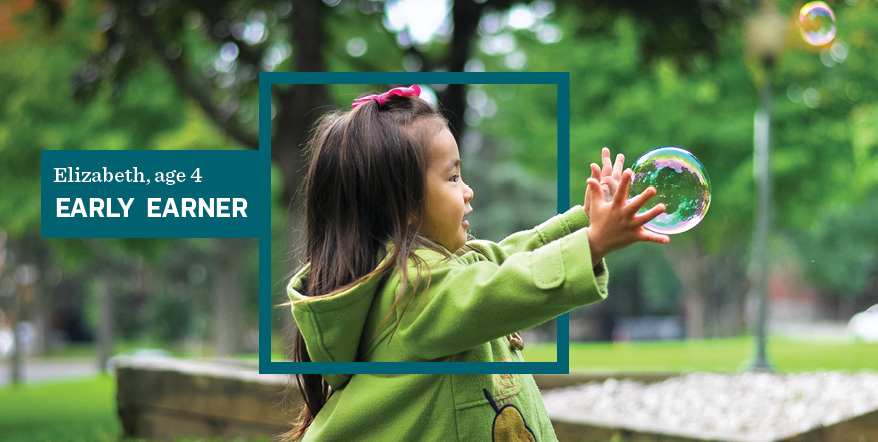
The ability to understand abstract money concepts develops as a child grows. Look for these milestones:
Ages 3 – 5: Introduce Basic Money Concepts
One of the important questions parents should ask during this life stage is, “Has the child developed basic values and attitudes around keeping (saving) and using (consuming) resources?”
When it comes to money, this translates to understanding the difference between saving and spending. A good way to start is with coins. Given a limited number of coins, talk to them about using them all at once versus setting some aside for something they may want later.
Toy cash registers and piggy banks are a great gift for this age range!
Ages 6 – 12: Set Savings Goals
When kids enter this age range, it’s important that they start to grasp the concept of planning. This is when savings goals become important. For one thing, a conversation about goals encourages them to think about what they want to buy now, as well as in the near and distant future. Buying more expensive things down the road means they can’t spend all their money right now, which is a cornerstone of understanding personal finance.
Another way to help your child understand about money and planning is to create a set of money jars! This is a great twist on the piggy bank—you can buy them or make your own with your kids . Label them “Spend,” “Save,” and “Give.” These jars are a fun, crafty way to teach kids about the importance of saving and planning.
Ages 13 – 21: Boost Financial Confidence
For teens and young adults, building confidence is critical, both personally and financially. As a parent, you can empower your children by ensuring they follow through with their financial plans. Whether it’s sticking to a budget, achieving their savings goals, or keeping a part-time job, set them up for success through encouragement and guidance.
Additionally, the CFPB says children in this age range should be able to identify trusted sources of financial information. In this age of financial scams, having the knowledge and confidence to say “No” to a dubious offer is a highly valuable skill.
For more ideas and resources on teaching your kids about money, visit our partner BALANCE.* Note: BALANCE is not owned or operated by NWCU. BALANCE is a nonprofit certified by HUD to provide comprehensive housing counseling service and is accredited by the Council on Accreditation of Services for Families and Children, Inc.
How Sprout Savings can Help Your Children Learn about Money
Talking to your children about money can be challenging, but Northwest Community is committed to giving you the tools and support you need to help your children build good financial habits.
When your child opens a Youth Share Savings account, you can opt them in to the Sprout Savings program at the same time. The Sprout Savings program encourages savings habits in kids up to 17 years old: when you enroll, you receive a money plant growing kit! And every time you make an in-branch deposit of $10+, you’ll get a prize.
Learn More About Sprout Savings